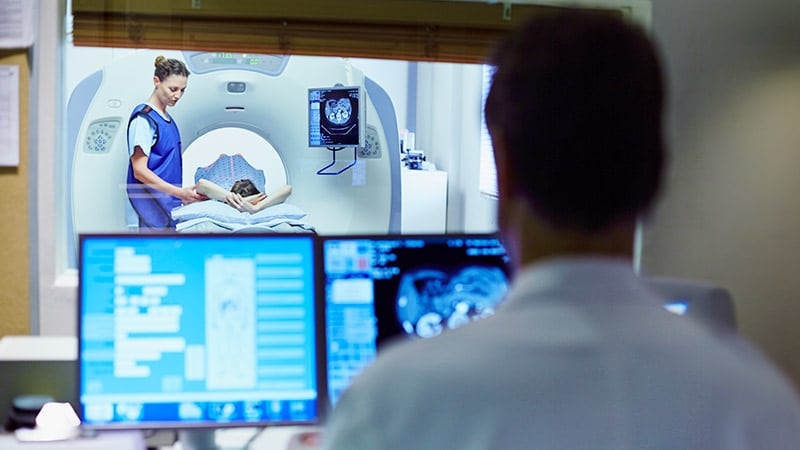Lung Cancer Screening Associated with Earlier Diagnosis and Improved Survival in Retrospective Study of Veteran Patients
핵심 개념
Lung cancer screening was associated with earlier-stage diagnoses and improved overall and lung cancer-specific survival rates among Veteran Health Administration patients.
초록
This retrospective study examined the impact of lung cancer screening on diagnosis and survival outcomes among Veteran Health Administration patients diagnosed with lung cancer between 2011 and 2018.
Key findings:
3.9% of the 57,919 lung cancer patients had undergone screening with at least one low-dose CT scan prior to their diagnosis.
Screened patients had double the rate of stage I diagnoses (52% vs 27%) and about one-third the rate of stage IV diagnoses (11% vs 32%) compared to unscreened patients.
Screened patients had significantly better overall survival rates at 1 year (81.2% vs 56.6%), 2 years (69.9% vs 41.1%), and 5 years (44.9% vs 22.3%).
Lung cancer-specific survival rates were also higher in the screened group at 1 year (82.5% vs 58.7%), 2 years (74.3% vs 44.4%), and 5 years (59.0% vs 29.7%).
Among screening-eligible patients who received guideline-concordant treatment, screening was associated with substantial reductions in all-cause mortality (adjusted HR 0.79) and lung cancer-specific mortality (adjusted HR 0.61).
The authors conclude that these findings provide real-world evidence supporting the benefits of lung cancer screening observed in randomized trials, and hope it will spur greater uptake of this life-saving intervention.
Lung Cancer Screening Can Boost Early Diagnosis, Survival
통계
3.9% of 57,919 lung cancer patients had prior lung cancer screening.
Screened patients had a 52% rate of stage I diagnosis vs 27% in unscreened patients.
Screened patients had an 11% rate of stage IV diagnosis vs 32% in unscreened patients.
1-year overall survival was 81.2% in screened vs 56.6% in unscreened patients.
2-year overall survival was 69.9% in screened vs 41.1% in unscreened patients.
5-year overall survival was 44.9% in screened vs 22.3% in unscreened patients.
1-year lung cancer-specific survival was 82.5% in screened vs 58.7% in unscreened patients.
2-year lung cancer-specific survival was 74.3% in screened vs 44.4% in unscreened patients.
5-year lung cancer-specific survival was 59.0% in screened vs 29.7% in unscreened patients.
인용구
"These findings provide corroboration of the results of randomized [lung cancer screening] trials in clinical practice."
"We hope that the striking association between [lung cancer screening], earlier stage diagnosis of lung cancer, and improved mortality spurs a more robust uptake of this life-saving intervention into clinical practice."
핵심 통찰 요약
by Marilynn Lar... 게시일 www.medscape.com 06-20-2024
https://www.medscape.com/viewarticle/lung-cancer-screening-can-boost-early-diagnosis-survival-2024a1000bhb
더 깊은 질문
What factors may have contributed to the low screening uptake rate of only 3.9% in this Veteran population?
The low screening uptake rate in this Veteran population can be attributed to various factors. One primary reason could be the lack of awareness among both patients and healthcare providers regarding the benefits of lung cancer screening. Additionally, there may be logistical barriers such as limited access to screening facilities, long wait times for appointments, and transportation issues for veterans living in rural areas. Moreover, there could be cultural factors or misconceptions about screening procedures that deter individuals from seeking preventive care. The complexity of the healthcare system, including insurance coverage and out-of-pocket costs, could also play a role in the low uptake rate.
How do the survival benefits of lung cancer screening compare to other cancer screening modalities, and what are the implications for healthcare policy and resource allocation?
The survival benefits of lung cancer screening, as demonstrated in this study, are significant and show improved outcomes for patients who undergo screening compared to those who do not. This highlights the importance of early detection in improving survival rates for lung cancer patients. When compared to other cancer screening modalities such as mammography for breast cancer or colonoscopy for colorectal cancer, lung cancer screening has shown to have a substantial impact on mortality reduction. These findings underscore the need for healthcare policy to prioritize and promote lung cancer screening programs, allocate resources for screening initiatives, and integrate screening guidelines into routine clinical practice. By investing in lung cancer screening, healthcare systems can potentially save lives and reduce the burden of advanced-stage cancer treatments.
Given the significant survival differences, what ethical considerations arise around ensuring equitable access to lung cancer screening, especially for underserved populations?
The significant survival differences observed between screened and unscreened patients raise important ethical considerations regarding equitable access to lung cancer screening, particularly for underserved populations. It is crucial to address disparities in access to screening based on factors such as socioeconomic status, race, geographic location, and insurance coverage. Healthcare providers and policymakers must work towards eliminating barriers to screening, including financial constraints, lack of education about screening benefits, and limited availability of screening facilities in underserved areas. Ethical considerations also include ensuring informed consent, patient autonomy, and the right to access preventive care for all individuals, regardless of their background. By prioritizing equity in access to lung cancer screening, healthcare systems can strive towards reducing health disparities and improving outcomes for all patients.
0
